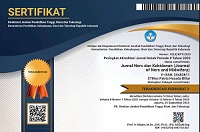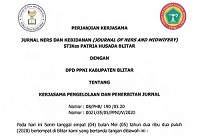Peran Keluarga dalam Program Indonesia Sehat dengan Pendekatan Keluarga (PIS-PK) melalui Pelaksanaan Program Keluarga Berencana (KB)
DOI:
https://doi.org/10.26699/jnk.v7i2.ART.p170-176Keywords:
Program Indonesia Sehat, PIS-PK, Peran KeluargaAbstract
Program Indonesia Sehat yang diluncurkan Kementerian Kesehatan tahun 2016, disebabkan oleh masih belum tercapainya misi “Indonesia Sehatâ€sesuai target yang telahditetapkan. Berbagai masalah kesehatan yang belumtercapai salah satunya adalah Pencapaian Program Keluarga Berencana.Tujuan penelitan ini adalah mengetahui bagaimana peran keluarga dalam Program Indonesia sehat dengan pendekatan keluarga (PIS-PK) dalam Program Keluarga Berencana. Desain penelitian yang digunakan dalam penelitian ini adalah Diskriptif dengan pendekatan Cross Sectional. Populasi dalam penelitian ini adalah seluruh keluarga di wilayah Puskesmas Sumurgung Kecamatan Palang Kabupaten Tuban, yaitu sebanyak 9570 keluarga, dengan tehnik pengambilan sampel secara Cluster diperoleh sampel sebanyak 384 keluarga.Pengumpulan data dilakukan dengan menggunakan kuesioner, yang diambil dari materi lembar balik dari Program Indonesia Sehat dengan Pendekatan Keluarga (PIS-PK) dari Kementerian Kesehatan. Data yang terkumpul dianalisa dengan prosentase dan disajikan dalam bentuk tabel. Hasil penelitian menunjukkan Peran keluarga dalam mengikuti Program Keluarga Berencana, mengacu dari pelaksanaan 5 tugas keluarga yaitu Mayoritas keluarga (99,22%) Mengenal tentang Keluarga Berencana, Lebih dari separoh keluarga (68, 23 %) mampu mengambil Keputusan untuk melakukan Keluarga Berencana, Lebih dari separoh keluarga (51,82%) mengikuti program Keluarga Berencana, Lebih dari separoh keluarga (56,25%) mampu memodifikasi Lingkungan bagi keluarga yang mengikuti Kb, dan Mayoritas keluarga (99,22%) mampu memanfaatkan fasilitas kesehatan terdekat untuk ikut program keluarga Berencana. Untuk tetap meningkatkan peran keluarga yang belum optimal kerjasama petugas kesehatan/pelayanan kesehatan terdekat, kader kesehatan dan keluarga sangat dibutuhkan, agar program ini tetap bisa berjalan secara berkesinambungan, dan mencapai hasil yang diharapkan.
Â
The Healthy Indonesia Program launched by the Ministry of Health in 2016 was the consequence of the "Healthy Indonesia" mission which was not achieved the targets set. One of achievement which was not achieved the target set was the Birth Control Program. The purpose of this study was to find out the way how to improve the role of families in the healthy Indonesia Program with the family approach (PIS-PK) in the Birth Control Program. The study used descriptive with Cross Sectional approach. The population in this study was the whole family in the area of the Puskesmas in Sumurgung District in Palang District in Tuban, as many as 9570 families. The sample was 384 families taken by cluster sampling technique. The data was collected by questionnaire, taken from the flipchart material from the Healthy Indonesia Program with the Family Approach (PIS-PK) from the Ministry of Health. The collected data was analyzed with a percentage and presented in tabular form. The results of the study showed that family behavior follows the Birth Control Program, referring to the implementation of 5 family tasks. The majority of families (99.22%) were familiar with birth control program, more than half of families (68, 23%) are able to make decisions to do birth control program, more than half of families (51.82%) follow the family birth control program, more than half of families (56.25%) were able to modify the environment for families following the Kb, and the majority of families (99.22%) were able to utilize the nearest health facility to participate in the birth control program. In order to increase the role of the family that was not optimal the cooperation of health workers / closest health services, health cadres and families are needed, so that this program can continue to run continuously, and achieve the expected results.
References
Ahmad, Z. et al. (2014) ‘Family Functioning , Cognitive Distortion and Resilience among Clients under Treatment in Drug Rehabilitation Centres in Malaysia’, Procedia - Social and Behavioral Sciences. Elsevier B.V., 140, pp. 150–154. doi: 10.1016/j.sbspro.2014.04.401.
Akbari, F. et al. (2016) ‘Incorporating Family Function into Chronic Pain Disability : The Role of Catastrophizing’, Pain Research andManagement. Hindawi Publishing Corporation, 2016. Available at: http://dx.doi.org/10.1155/2016/6838596%0AResearch.
Alisa, M. et al. (2014) ‘Hubungan Tugas Perkembangan Keluarga Tahap II ( Childbearing Family ) dengan Kelengkapan Imunisasi DPT pada Bayi di Wilayah Kerja Puskesmas Mangli Kabupaten Jember ( The Correlation Between Second Stage ( Childbearing ) of Family Development Task with Com’, e-Jurnal Pustaka Kesehatan, 2(3), pp. 515–522. Available at: https://jurnal.unej.ac.id/index.php/JPK/article/view/2379/1949.
Banovcinova, A., Levicka, J. and Veres, M. (2014) ‘The Impact of Poverty on the Family System Functioning’, Procedia - Social and Behavioral Sciences. Elsevier B.V., 132, pp. 148–153. doi: 10.1016/j.sbspro.2014.04.291.
Dalgaard, N. T. and Montgomery, E. (2017) ‘The transgenerational transmission of refugee trauma : family functioning and children ’ s psychosocial adjustment’, International Journal of Migration, Helath and Social Care, 13(3), pp. 289–301. doi: 10.1108/IJMHSC-06-2016-0024.
Dorell, Å. and Sundin, K. (2016) ‘Becoming visible e Experiences from families participating in Family Health Conversations at residential homes for older people’, Geriatric Nursing. Elsevier Inc, 37(4), pp. 260–265. doi: 10.1016/j.gerinurse.2016.02.015.
Erlinda, V. (2015) ‘Penerapan Model Family-Centered Nursing Terhadap Pelaksanaan Tugas Kesehatan Keluarga Dalam Pencegahan ISPA Pada Balita Di Wilayah Kerja Puskesmas Simpang Tiga Kabupaten Aceh Besar Application Of Family-Centered Nursing Model On The Execution Of Family He’, Jurnal Kedokteran Yarsi, 23(November 2014), pp. 165–186. Available at: http://academicjournal.yarsi.ac.id/index.php/jurnal-fk-yarsi/article/view/231/167.
Fatma Putri Sekaring Tyas, Tin Herawati, E. S. (2017) ‘TUGAS PERKEMBANGAN KELUARGA DAN KEPUASAN PERNIKAHAN PADA PASANGAN MENIKAH USIA MUDA’, Jurnal Ilmu Keluarga dan Konsumen, 10(2), pp. 83–94. Available at: http://dx.doi.org/10.24156/jikk.2017.10.2.83.
Fauziah, A. N. (2019) ‘Keluarga Sehat Berdasarkan Pendekatan Keluarga Di RW 03 Kalurahan Mojosongo Surakarta’, Jurnal Kebidanan Indonesia, 8(1), pp. 101–110. Available at: http://jurnal.stikesmus.ac.id/index.php/JKebIn/article/view/165/139.
Friedman (2017) Buku Ajar Keperawatan Keluarga: Riset Teori Dan Praktik. 5th edn. Jakarta: Buku Kedokteran EGC.
Guo, Y. and Liu, Y. (2015) ‘Family functioning and depression in primary caregivers of stroke patients in China’, International Journal of Nursing Sciences. Elsevier Ltd, 2(2), pp. 184–189. doi: 10.1016/j.ijnss.2015.05.002.
Hakio, N. et al. (2015) ‘Parents ’ experiences of family functioning , health and social support provided by nurses — A pilot study in paediatric intensive care’, Intensive & Critical Care Nursing. Elsevier Ltd, 31(1), pp. 29–37. doi: 10.1016/j.iccn.2014.08.001.
Harmoko (2012) Asuhan Keperawatan Keluarga. Yogyakarta: Ppustaka Pelajar.
Jiang, S. et al. (2014) ‘Family function and health behaviours of stroke survivors’, International Journal of Nursing Sciences. Elsevier Ltd, 1(3), pp. 272–276. doi: 10.1016/j.ijnss.2014.05.024.
Kementerian Kesehatan RI (2016) Program Indonesia Sehat dengan pendekatan Keluarga. Jakarta: Kementerian Kesehatan RI.
Lola Illona Elfani Kausar, Herawati, E. P. (2015) ‘Tugas Kesehatan Keluarga pada Anggota Keluarga yang Menderita TB Paru’, Dunia Keperawatan, 3(2), pp. 34–45. Available at: https://ppjp.ulm.ac.id/journal/index.php/JDK/article/view/718/623.
Matejevic, M., Jovanovic, D. and Ilic, M. (2015) ‘Patterns of Family Functioning and Parenting Style of Adolescents with Depressive Reactions’, Procedia - Social and Behavioral Sciences. Elsevier B.V., 185, pp. 234–239. doi: 10.1016/j.sbspro.2015.03.460.
Matejevica, M., Jovanovica, D. and Lazarevic, V. (2014) ‘Functionality of family relationships and parenting style in families of adolescents with substance abuse problems’, Procedia - Social and Behavioral Sciences. Elsevier B.V., 128, pp. 281–287. doi: 10.1016/j.sbspro.2014.03.157.
Mustafa, E. (2014) ‘The Relationship between Bullying , Family Functions and Perceived Social Support Among High School Students’, Procedia - Social and Behavioral Sciences, 159, pp. 492–496. doi: 10.1016/j.sbspro.2014.12.412.
Nikolaev, E. L., Baranova, E. A. and Petunova, S. A. (2016) ‘Mental Health Problems in Young Children : the Role of Mothers ’ Coping and Parenting Styles and Characteristics of Family Functioning’, Procedia - Social and Behavioral Sciences. The Author(s), 233(May), pp. 94–99. doi: 10.1016/j.sbspro.2016.10.152.
Perry, P. & (2005) Fundamental Keperawatan. I. Jakarta: Buku Kedokteran EGC.
Priasmoro, D. P. et al. (2016) ‘ANALISIS FAKTOR-FAKTOR KELUARGA YANG BERHUBUNGAN DENGAN PERILAKU AGRESIF PADA REMAJA DI KOTA MALANG (DENGAN PENDEKATAN TEORI STRUKTURAL FUNGSIONAL KELUARGA)’, Jurnal Ilmu Keperawatan, 4(2), pp. 114–126. Available at: http://jik.ub.ac.id/index.php/jik/article/view/100/113.
Rahmaita, Diah Krisnatuti, L. N. Y. (2016) ‘The Effects of Family Developmental Tasks on Marital Satisfaction on First-Time’, Jurnal Ilmu Keluarga dan Konsumen, 9(1), pp. 1–10. Available at: http://dx.doi.org/10.24156/jikk.2016.9.1.1%09.
Walker, C., Laura, A. and Jay, A. (2015) ‘Adverse Childhood Experiences , Family Functioning , and Resilience in Military Families: A Pattern-Based Approach’, Family Relations, 64(1), pp. 44–63. doi: 10.1111/fare.12108.
Downloads
Additional Files
Published
How to Cite
Issue
Section
License
Copyright (c) 2020 Jurnal Ners dan Kebidanan (Journal of Ners and Midwifery)

This work is licensed under a Creative Commons Attribution-ShareAlike 4.0 International License.






